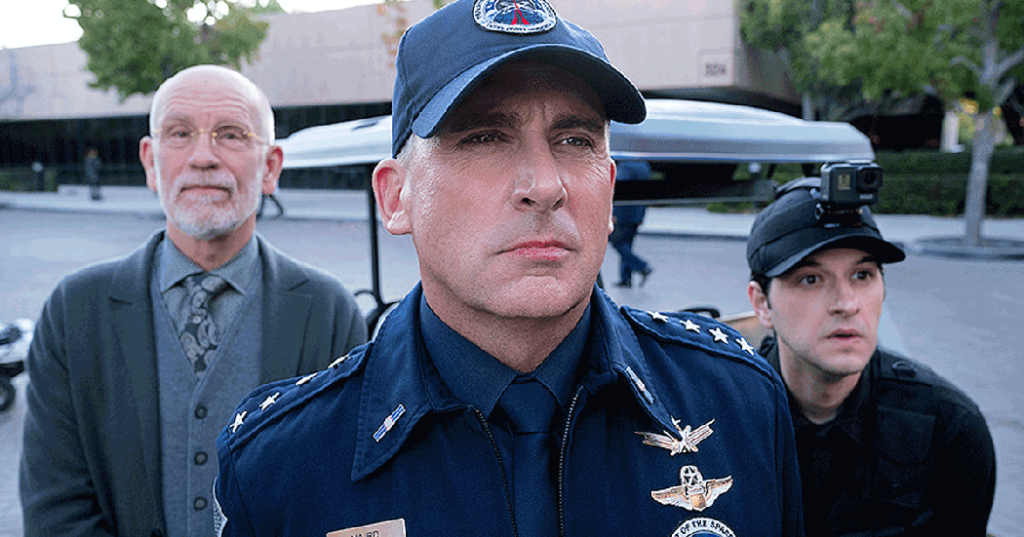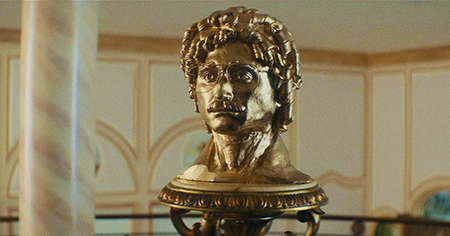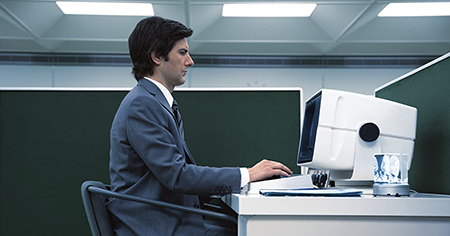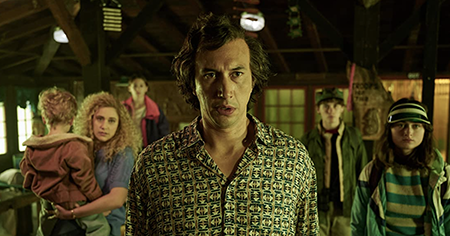
review | Space Force
Netflix’ blatant and desperate attempt to try to salvage some of its Office audience results in a sitcom that manages to fire on no cylinders
by Michael Gaughn
June 6, 2020
It’s not hard to figure out how this all began. Netflix had an unexpected boon when Millennials didn’t discover The Office until after it had migrated over to the subscription service, but then seized on and devoured it as if they’d just summoned up manna. But then, as part of the seemingly endless proliferation of streaming providers, NBC decided to launch Peacock and bring The Office back under its wing, depriving Netflix of what is probably its steadiest flow of viewers.
While they would never publicly admit it, Netflix suddenly found itself desperate for a new series that looked, walked, and smelled enough like The Office to retain a sizable portion of that show’s audience.
Enter Office creator Greg Daniels and star Steve Carell with the idea for a service comedy—an idea as old as the hills (or at least as old as Aristophanes)—and as current as today’s headlines. Or at least that’s how they would have presented it at the pitch meeting—assuming they even had to do a pitch before Netflix handed them a blank check.
To cut right to the chase, Space Force is nothing but a mess, way overinflated in every possible way, the most hackneyed of sitcom premises puffed up with a stupidly large budget and a random mob of a cast. If this had been made for a fraction of the money and with a little less latitude, the constraints might have brought some badly needed discipline to the exercise, yielding something tighter, funnier, and more watchable. Maybe.
What we have instead is the Netflix equivalent of It’s a Mad, Mad, Mad, Mad World—a too-big-to-fail comedy that puts a gun to your head and tells you to laugh because it’s desperate to justify its existence. There are some laughs, occasionally (I have to admit to falling for the space chimp bit), but far too rarely. Space Force is the sitcom equivalent of spending an evening watching a room full of monkeys perched at typewriters and waiting for one of them to randomly tap out a joke.
To go with another animal analogy, it’s a great, big slobbering Labrador of a show, utterly superficial, with no ideas or convictions of its own, desperately trying to please everybody and willing to do anything to get a little attention. If you’ve heard that it’s a spoof or satire, you heard wrong. Space Force doesn’t bite—it licks your face instead. It doesn’t have the creative courage to skewer a damn thing.
But enough generalities; let’s talk specifics. You get the sense Carell loves The Great Santini and decided, for some reason, to drag it into the present. But it would be hard to name another actor more different from Carell, with his extremely limited acting range, than Robert Duvall. That cognitive dissonance might help explain why Carrel can’t get a bead on his character but constantly shifts between playing a pint-sized general, Michael Scott, and an ambiguous third being who might actually be Carell himself.
The cast is big and, almost without exception, unexceptional, the most offensive member being Ben Schwartz as Carell’s media manager. His every moment on screen is the comedy equivalent of waterboarding. Carell’s character fires him in the first episode, which seemed logical and felt definitive, and led to the hope we were rid of him forever. But this is a cliché-laden sitcom after all, so he keeps arbitrarily popping back up throughout the series, like a horror-movie villain or a rodent, even though his shtick is predictable, his actions implausible, and he fails to generate any laughs.
The biggest offense—although you can’t really blame the completely bland, inoffensive actress saddled with playing her—is the pilot who starts out as Carrel’s whirlybird chauffeur and somehow ends up commanding a lunar mission. She’s not a character or the product of a legitimate creative act but a fashionable amalgam, born of checking off a bunch of boxes meant to suck up to contemporary sensibilities. As far as you can get from three-dimensional, she’s a direct descendant of the personified virtues in a medieval morality play.
More specifically, she’s only there to be the token tough-but-caring black girl who rises to a level of great responsibility because she has a massive father complex.
If there’s any glimmer of light in this black hole of a series, it’s John Malkovich as the lead scientist. He’s ultimately nothing but a stereotypically affected straw man, Alice to Carell’s Ralph, Felix to his Oscar. It’s only Malkovich’s ability to make something out of nothing that causes his screen time to add up to anything resembling creative redemption.
Pardon a little inside baseball, but I watched Space Force straight through when it debuted and planned to publish this review then. But my reaction was so strong, I felt the need to buy some distance before going public with my thoughts. Unfortunately, the weeks that have lapsed since have only reinforced my original impressions.
If you’re big on Anointed vs. Underclass fictions that come down firmly for the Anointed, this show is for you. If you find succor in a day-care center view of the world, then you’ll probably actually enjoy the image of a military mission jubilantly jumping around the lunar surface like a bunch of infants. I didn’t. Space Force shows how far we’ve devolved since Metropolis, and suggests the Fredersens of the world have irrevocably won.
Michael Gaughn—The Absolute Sound, The Perfect Vision, Wideband, Stereo Review, Sound & Vision, The Rayva Roundtable, marketing, product design, some theater designs, a couple TV shows, some commercials, and now this.
© 2025 Cineluxe LLC





